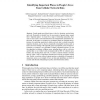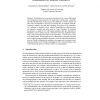208 search results - page 10 / 42 » Computing Anonymously with Arbitrary Knowledge |
102
click to vote
HICSS
2003
IEEE
15 years 7 months ago
2003
IEEE
Social factors, such as status differences, may prevent some members from participating in group decisions. Computerized group decision support systems (GDSSs) can reduce social i...
111
Voted
PODC
2010
ACM
15 years 4 months ago
2010
ACM
We study the computational power of a distributed system consisting of simple autonomous robots moving on the plane. The robots are endowed with visual perception but do not have ...
117
click to vote
FOCS
2003
IEEE
15 years 7 months ago
2003
IEEE
We show how a polynomial-time prover can commit to an arbitrary finite set Ë of strings so that, later on, he can, for any string Ü, reveal with a proof whether Ü ¾ Ë or Ü ...
240
click to vote
PERVASIVE
2011
Springer
14 years 5 months ago
2011
Springer
People spend most of their time at a few key locations, such as home and work. Being able to identify how the movements of people cluster around these “important places” is cru...
125
Voted
FOSSACS
2009
Springer
15 years 9 months ago
2009
Springer
Bisimulation between processes has been proven a successful method for formalizing security properties. We argue that in certain cases, a scheduler that has full information on the...


